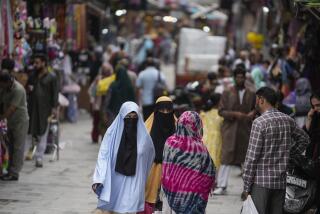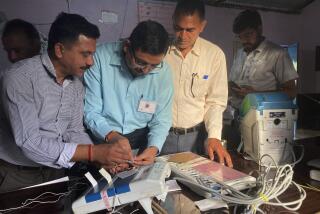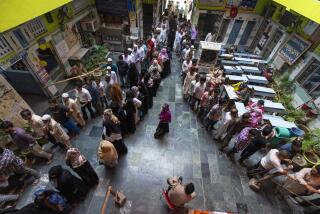Charges of Forced Voting Mar Kashmir Poll
- Share via
NEW DELHI — In an exercise denounced by many as a parody of democracy, voters in predominantly Muslim areas of the troubled Himalayan state of Jammu and Kashmir were called to the polls Thursday for the first elections in seven years.
Witnesses told reporters that crowds in at least one town charged polling booths, complaining that security forces were trying to force people into voting. The polling--already completed in India’s other states--is for representatives in India’s national Parliament and took place in two of the state’s constituencies.
“We do not want elections, we want freedom,” a group of women screamed before police fired tear-gas shells and bullets into the air to disperse about 1,000 protesters in the town of Baramula, west of Srinagar, the state’s summer capital.
In a square in nearby Sopur, hundreds of people shouted pro-independence slogans.
“The army came early in the morning and dragged people from their houses. But we gathered all the men, women, boys and girls to come here. We will not vote,” Mohammed Safi, a pharmaceuticals salesman, told Associated Press.
“We don’t want to be with India. They have destroyed our lives. We want only freedom,” he said. “These are fake elections.”
In some locales, journalists saw Indian soldiers herding men toward the polls. One man in a group escorted by troops told reporters, “We are being forced to vote. We do not want this election.”
Many Kashmiris complained of such coercion at about 2,000 polling stations. “They said if we do not vote they will beat us,” Gulan Mohidin, a resident of Anantnag, southeast of Srinagar, told reporters.
Some people claimed that Indian security personnel visited mosques before morning prayers and escorted worshipers to vote. Other Kashmiris were rousted from their homes in towns and villages by soldiers after sunrise and taken to polling stations.
Neighboring Pakistan, which claims Kashmir for itself, accused India of mounting a “campaign of terror” to turn out the vote.
The commander of Indian army troops in the state denied that his soldiers were pressuring anyone. “Rumors are going around some media that say the army is compelling people to vote. Let me make it very clear we are not doing that thing,” Lt. Gen. J.S. Dhillon told reporters in Srinagar.
When polls closed at 5 p.m., Indian government officials claimed that the turnout was 35% and 43% in the two constituencies--far higher than expected.
It was a “mandate for the return of peace, normalcy and democracy,” said Ashok Kumar, the state’s highest civil administrator. Participation in the last election, in 1989, was little better than 5%.
That year, a separatist uprising broke out in India’s only Muslim-majority state. The following year, Jammu and Kashmir was placed under direct rule from New Delhi. At least 20,000 people are believed to have died in the revolt.
For Indian authorities, Thursday’s vote will probably serve as proof that their controversial campaign of pacification in Kashmir, which human rights organizations say includes torture, rape and summary execution, is succeeding.
Militant separatists in Kashmir had demanded that their countrymen boycott the election and threatened to disrupt the voting. They claimed responsibility for a car bomb that killed at least 16 people in a bustling New Delhi market Tuesday, and are suspected by some Indian officials of a bombing aboard a bus in Rajasthan the next day that killed 22 passengers.
There were three bomb blasts Thursday in Sopur and a grenade attack on a candidate, Indian officials said.
In New Delhi, Prime Minister Atal Behari Vajpayee said, “We are determined to give no opportunity to powers who want to keep this part of India without its rightful democratic representation in the Lok Sabha [lower house of Parliament].”
Thursday’s election was the second phase of voting in Jammu and Kashmir that has been staggered over three days to allow constituencies to be flooded with an additional 50,000 paramilitary troops for security purposes and thousands of civil servants from other states to staff polling booths.
Parliamentary elections concluded in the rest of India on May 7. The last phase of voting takes place next Thursday. The results are not expected to affect the balance of power in the Indian Parliament, where a shaky government of the Hindu nationalist Bharatiya Janata Party headed by Vajpayee was sworn in May 16.
In violence unrelated to the voting, three Indian soldiers were killed Thursday in Jammu and Kashmir in a gunfight with militants at Sunderbani, 50 miles from Jammu, the state’s winter capital, authorities said.
More to Read
Sign up for Essential California
The most important California stories and recommendations in your inbox every morning.
You may occasionally receive promotional content from the Los Angeles Times.













